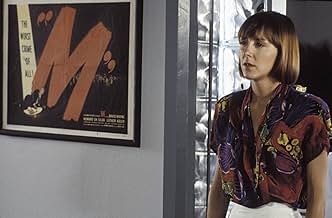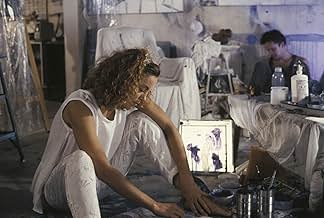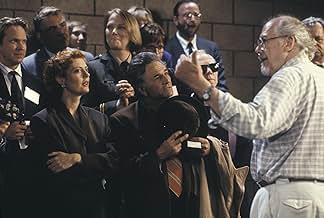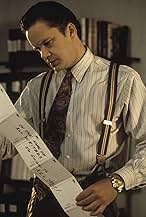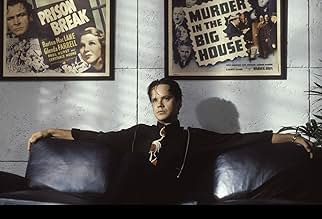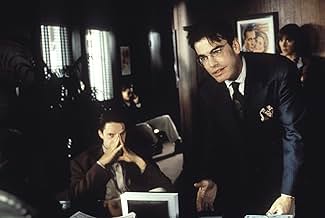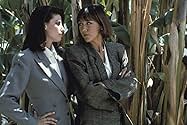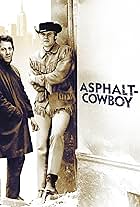Ein Hollywood-Manager erhält Morddrohungen von einem Autor, dessen Drehbuch er abgelehnt hat, aber welches?Ein Hollywood-Manager erhält Morddrohungen von einem Autor, dessen Drehbuch er abgelehnt hat, aber welches?Ein Hollywood-Manager erhält Morddrohungen von einem Autor, dessen Drehbuch er abgelehnt hat, aber welches?
- Für 3 Oscars nominiert
- 24 Gewinne & 33 Nominierungen insgesamt
Empfohlene Bewertungen
Griffin Mill (Tim Robbins) is a studio executive who listens to about fifty thousand pitches for films a year, but can only green light twelve, and even then he doesn't get the final say on whether or not a movie gets made. So not being a nice guy to begin with, he figures he's probably made enemies of quite a few people who never got past the gate that he keeps. Then he starts getting threatening letters on his windshield, delivered at the studio, etc. From a writer angry that he said he'd call him about his idea and never did. Mill decides that the angry writer must be David Kahane, and so one night he goes to a movie theater where Kahane is watching "Bicycle Thieves", they talk, then they go get drinks at a restaurant, but then Kahane starts angrily mocking him on the way to their cars and Mill beats him to death in a fit of rage. Stunned at what he did, Mill tries to make it look like a robbery and then leaves.
But this is not a noir - Mill doesn't panic or lie. When the police question him he admits that he met Kahane, admits their relationship, admits everything except the murder. The police suspect him from the start but he doesn't let their harassment get to him. On top of that the harassing letters continue - he killed the wrong writer.
I thought this film was hilarious. It is just so other-worldly with people having very odd reactions, almost like a David Lynch film, so that at times I think Mill is just daydreaming. But, no, these people really did say or do these weird things. And then there are all of the celebrities who are sometimes playing themselves and sometimes are playing a character in the film. And if you want to know why Lyle Lovitt of all people is playing a cop here you have to see the hilarious final scene. Basically the moral of this movie is, in the words of "Crimes and Misdemeanors" - " if you want a happy ending, you should see a Hollywood movie."
But this is not a noir - Mill doesn't panic or lie. When the police question him he admits that he met Kahane, admits their relationship, admits everything except the murder. The police suspect him from the start but he doesn't let their harassment get to him. On top of that the harassing letters continue - he killed the wrong writer.
I thought this film was hilarious. It is just so other-worldly with people having very odd reactions, almost like a David Lynch film, so that at times I think Mill is just daydreaming. But, no, these people really did say or do these weird things. And then there are all of the celebrities who are sometimes playing themselves and sometimes are playing a character in the film. And if you want to know why Lyle Lovitt of all people is playing a cop here you have to see the hilarious final scene. Basically the moral of this movie is, in the words of "Crimes and Misdemeanors" - " if you want a happy ending, you should see a Hollywood movie."
For anyone who loves movies, "The Player" is a treat.
To start, the screenplay is first-rate. The plot that holds the entire film together is superbly crafted; very few films leave you guessing right to the end as this one does. The finer details also shine through, such as the sales pitch scenes, which are inarguably classic (i.e. "The Graduate II").
I loved the attention to detail in "The Player". One can find a new detail every time one watches the film. For example, the opening sequence is a very long, continuous shot during which characters are discussing Hitchcock's "Rope", which appears to be a movie filmed all in one continuous shot. The sheer number of cameos in "The Player" makes it difficult to list all of them, so I won't even try.
"The Player" is one film that sets out to skewer Hollywood and actually succeeds. One only has to view the Bruce Willis/Julia Roberts sequence in order to understand this. My hat goes off to Robert Altman for making another excellent film.
To start, the screenplay is first-rate. The plot that holds the entire film together is superbly crafted; very few films leave you guessing right to the end as this one does. The finer details also shine through, such as the sales pitch scenes, which are inarguably classic (i.e. "The Graduate II").
I loved the attention to detail in "The Player". One can find a new detail every time one watches the film. For example, the opening sequence is a very long, continuous shot during which characters are discussing Hitchcock's "Rope", which appears to be a movie filmed all in one continuous shot. The sheer number of cameos in "The Player" makes it difficult to list all of them, so I won't even try.
"The Player" is one film that sets out to skewer Hollywood and actually succeeds. One only has to view the Bruce Willis/Julia Roberts sequence in order to understand this. My hat goes off to Robert Altman for making another excellent film.
Robert Altman gets under my skin. His films are worthy of great respect, yet they are frequently as irritating as they are brilliant. The Player is, as much as Short Cuts, a quintessential Altman film. It is also one of the best roles Tim Robbins has ever enjoyed.
This film is about Hollywood's dark underbelly. The Player eviscerates its subject by twisting justice, political gamesmanship and artistic integrity into new configurations. For non-film-buffs or non-professionals some of the humor may seem too subtle to notice. To film buffs and insiders, the humor is totally over the top.
Robbins plays a young studio exec who is playing the game to win and seems, at least part of the time, to have a conscience. Everything is going along fine for him until he starts receiving threatening calls and letters from a writer whose screenplays he has rejected, and an arch-rival is promoted to a position just above his own. Paranoia and real danger seem in the periphery of every scene in his life, as the make-believe of his industry and the reality of his life begin to blend freely.
Robbins makes a character who could easily have been totally unlikeable somehow sympathetic. Despite his amazing performance, liking the character makes you feel as if you should go stand in a shower and exfoliate for an hour or so. He is supported by excellent supporting work all around. Especially good are the two major women's roles - played by Greta Scachi and Bonnie Sherrow, and veteran camp character Dean Stockwell.
The photography is liberally and amusingly lifted from several classic thrillers, mysteries and dramas, and comes off fresh and original - not at all like a DePalmaesque bit of visual plagiarism. And the pace is brisk.
The Player is probably my favorite Altman film, and it is easily my favorite Tim Robbins film. It's entertaining, intelligent and, well, it has a bad attitude. See it some night when you're angry and you need a good dark laugh.
This film is about Hollywood's dark underbelly. The Player eviscerates its subject by twisting justice, political gamesmanship and artistic integrity into new configurations. For non-film-buffs or non-professionals some of the humor may seem too subtle to notice. To film buffs and insiders, the humor is totally over the top.
Robbins plays a young studio exec who is playing the game to win and seems, at least part of the time, to have a conscience. Everything is going along fine for him until he starts receiving threatening calls and letters from a writer whose screenplays he has rejected, and an arch-rival is promoted to a position just above his own. Paranoia and real danger seem in the periphery of every scene in his life, as the make-believe of his industry and the reality of his life begin to blend freely.
Robbins makes a character who could easily have been totally unlikeable somehow sympathetic. Despite his amazing performance, liking the character makes you feel as if you should go stand in a shower and exfoliate for an hour or so. He is supported by excellent supporting work all around. Especially good are the two major women's roles - played by Greta Scachi and Bonnie Sherrow, and veteran camp character Dean Stockwell.
The photography is liberally and amusingly lifted from several classic thrillers, mysteries and dramas, and comes off fresh and original - not at all like a DePalmaesque bit of visual plagiarism. And the pace is brisk.
The Player is probably my favorite Altman film, and it is easily my favorite Tim Robbins film. It's entertaining, intelligent and, well, it has a bad attitude. See it some night when you're angry and you need a good dark laugh.
'The Player (1992)' is a meta and witty inside-joke, jabbing at the ribs of tinsel-town in a cynical yet comedic way, and it manages to sardonically satirise the entire studio system, with a only little bit of self-aggrandising and perhaps an equal measure of self-deprecating. The picture isn't particularly funny, though it can cause some chuckles, but is instead the kind of sly smile inducing mockery that takes its time to dawn on you and isn't immediately obvious. It's this undercurrent that carries the flick much more than the main plot itself, so much so that the actual narrative becomes a part of the running gag as opposed to a vehicle for the individual jokes to spawn from. It's a unique, and somewhat acquired taste of a, film that's usually enjoyable and equally intelligent. 7/10
Griffin Mill is a young hotshot producer who everyone bows and scrapes to because he has the powers to get a movie made. However he starts getting bugged by a dissatisfied writer which leads to all kinds of deadly intrigue.
Just when I thought Altman had gone totally off-the-boil he suddenly jumps back with his most perfectly realised film. While hardly unapplauded on its release (and in short retrospect) this is a movie that will be regarded by future generations as a classic. It is so smart, sassy, funny and has a beginning, a middle and an end. The kind of tragicomedy that gets the best of both worlds.
Robbins is perfect as the lead. He doesn't do much or emote much. As Robert De Niro once said "most people don't show their emotions, they hide them." Occasionally we get behind the shield of human indifference, but only occasionally. We don't like him much - nor should we - but he is not so bad that we can't bare him. Indeed he is merely someone whose selfish world gets out of control. Whoopie Goldberg makes the most of her unlikely casting too.
The appearance of stars in guest parts adds a bit of icing, but that is all. I loved Altman's directions to the stars who had to play walk-ons (who else could have got that?) "remember, you are responsible for who you are on screen. You are playing yourselves!"
The sexy Scacchi plays the love interest with great skill. While just a muse she is a far better actress than most and this shows in her short screen time. Shame she hasn't more involvement in the main plot.
Like breaking a car down in to its competent parts, taking The Player apart only leaves an ugly mess of oil and metal. Together it drives a tight little film that has insight, drama and comedy. I would hesitate to call this a masterpiece, but it is a mini-masterpiece that however farfetched never reaches the point of being totally unbelievable.
The pay off at the end is one of the best belly-laughs any film buff could ever get. I doubt I will see a better film about modern day Hollywood in my lifetime. Like Pulp Fiction, a film that is as enjoyable the second time of viewing as the first.
Just when I thought Altman had gone totally off-the-boil he suddenly jumps back with his most perfectly realised film. While hardly unapplauded on its release (and in short retrospect) this is a movie that will be regarded by future generations as a classic. It is so smart, sassy, funny and has a beginning, a middle and an end. The kind of tragicomedy that gets the best of both worlds.
Robbins is perfect as the lead. He doesn't do much or emote much. As Robert De Niro once said "most people don't show their emotions, they hide them." Occasionally we get behind the shield of human indifference, but only occasionally. We don't like him much - nor should we - but he is not so bad that we can't bare him. Indeed he is merely someone whose selfish world gets out of control. Whoopie Goldberg makes the most of her unlikely casting too.
The appearance of stars in guest parts adds a bit of icing, but that is all. I loved Altman's directions to the stars who had to play walk-ons (who else could have got that?) "remember, you are responsible for who you are on screen. You are playing yourselves!"
The sexy Scacchi plays the love interest with great skill. While just a muse she is a far better actress than most and this shows in her short screen time. Shame she hasn't more involvement in the main plot.
Like breaking a car down in to its competent parts, taking The Player apart only leaves an ugly mess of oil and metal. Together it drives a tight little film that has insight, drama and comedy. I would hesitate to call this a masterpiece, but it is a mini-masterpiece that however farfetched never reaches the point of being totally unbelievable.
The pay off at the end is one of the best belly-laughs any film buff could ever get. I doubt I will see a better film about modern day Hollywood in my lifetime. Like Pulp Fiction, a film that is as enjoyable the second time of viewing as the first.
WUSSTEST DU SCHON:
- WissenswertesThe celebrity cameos were not written in the script. Robert Altman added them all in. No scripted dialogue was given to any celebrity with a cameo.
- PatzerWhen Mill reads the newspaper story about the murder, a closeup of article reveals that it is just the same few paragraphs printed over and over.
- Zitate
Griffin Mill: It lacked certain elements that we need to market a film successfully.
June: What elements?
Griffin Mill: Suspense, laughter, violence. Hope, heart, nudity, sex. Happy endings. Mainly happy endings.
June: What about reality?
- Crazy CreditsTim Robbins, Fred Ward and Cynthia Stevenson all enter the film when their names appear in the opening credits.
- Alternative VersionenIn the theatrical version there was a frontal nude scene of Tim Robbins at the hotel in the desert. This scene was removed for the cable version.
Top-Auswahl
Melde dich zum Bewerten an und greife auf die Watchlist für personalisierte Empfehlungen zu.
Details
- Erscheinungsdatum
- Herkunftsland
- Sprache
- Auch bekannt als
- El ejecutivo
- Drehorte
- 1921 Westholme Ave, Los Angeles, Kalifornien, USA(June Gudmundsdottir's house)
- Produktionsfirmen
- Weitere beteiligte Unternehmen bei IMDbPro anzeigen
Box Office
- Budget
- 8.000.000 $ (geschätzt)
- Bruttoertrag in den USA und Kanada
- 21.706.101 $
- Eröffnungswochenende in den USA und in Kanada
- 302.216 $
- 12. Apr. 1992
- Weltweiter Bruttoertrag
- 21.706.547 $
- Laufzeit2 Stunden 4 Minuten
- Farbe
- Sound-Mix
- Seitenverhältnis
- 1.85 : 1
Zu dieser Seite beitragen
Bearbeitung vorschlagen oder fehlenden Inhalt hinzufügen




